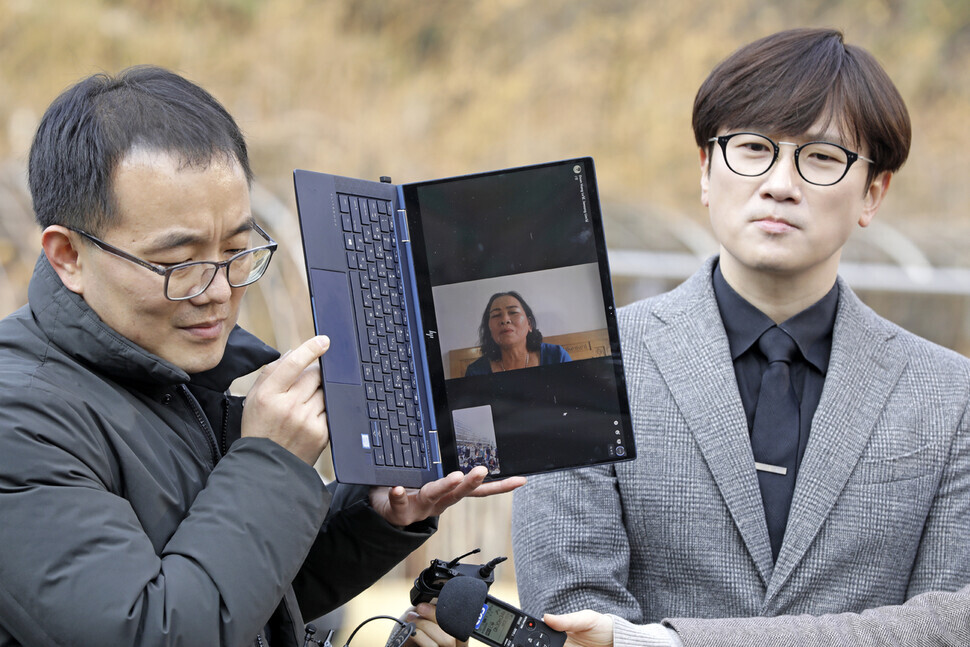hankyoreh
Links to other country sites 다른 나라 사이트 링크
[Editorial] Verdict on Korea’s massacre in Vietnam a first step in atonement

The first court ruling acknowledging South Korean troops’ massacre of civilians during the Vietnam War and recognizing the South Korean government’s responsibility to compensate victims was delivered on Tuesday.
Admitting that our troops committed heinous crimes against humanity during war is painful, as it puts South Korea to shame in front of the international community and history.
The fact that the judicial system made this truth concrete is a courageous admission that will go down in history and will allow South Korea to take a great step as a human rights state.
The Seoul Central District Court ruled in favor of the plaintiff in a lawsuit filed by Nguyen Thi Thanh against South Korea on Tuesday. Nguyen testified that when she was 8 years old, she lost her family and was seriously injured in the February 1968 massacre in which around 70 civilians were killed in her hometown in Quảng Nam, Vietnam.
The court reviewed various evidence, including testimonies from Vietnam War veterans and local militia members, and acknowledged most of Nguyen’s claims, ruling, “such acts clearly constitute criminality.”
The South Korean government has thus far wholly denied that its military carried out civilian massacres during the Vietnam War, an issue that was first exposed in earnest in a report by the Hankyoreh 21 news magazine in the early 2000s, despite specific pieces of evidence that were brought to light and demands made by citizens for the government to recognize the war crimes and to compensate the victims.
Even when Nguyen filed her lawsuit in 2020, the government denied responsibility by saying that there was no evidence or that, due to the nature of guerrilla war, the actions taken by troops were legitimate.
The fact that certain truths and responsibilities have been admitted in the name of the state through the judiciary branch is meaningful. The court also responded to the government’s claim that the statute of limitations for compensation had expired by stating, “There were obstacles that made it impossible [for the plaintiff] to objectively exercise [her] rights until the lawsuit was filed,” going to on to state, “Claiming that the statute of limitations has expired constitutes an abuse of rights.”
South Korea has a tragic history of being a victim of crimes against humanity, namely the prime atrocities that happened during the Japanese colonization of Korea: the Japanese military’s “comfort women” system of sexual slavery and forced conscription and recruitment.
If we demand apologies and compensation for these crimes from the Japanese government but remain silent on the horrors we have ourselves committed, we will never be free from criticisms of hypocrisy.
In particular, in response to the government’s claim that Vietnamese people cannot file lawsuits in Korean courts because of agreements between Vietnam, Korea and the US, the court stated, “It is difficult to say that such agreements hold the legal validity to block the claims of individual plaintiffs.”
This is a precise counterargument to the Japanese government’s claim that the 1965 Treaty on Basic Relations Between Japan and the Republic of Korea or the 2015 agreement on the “comfort women” issue resolved the matters of Japan’s forced conscription of Korean laborers and systematic sexual slavery.
Vietnam was the country with which Korea had the largest trade surplus last year and has long had close ties to South Korean society due to migrant laborers and intercultural marriage. South Korea must atone for its violence in Vietnam and work to further friendship and cooperation between the two countries going forward.
We can only hope that this ruling spurs the South Korean government to think in a more future-oriented fashion in regard to Vietnam.
Please direct questions or comments to [english@hani.co.kr]

Editorial・opinion
![[Column] Season 2 of special prosecutor probe may be coming to Korea soon [Column] Season 2 of special prosecutor probe may be coming to Korea soon](https://flexible.img.hani.co.kr/flexible/normal/500/300/imgdb/original/2024/0426/3317141030699447.jpg) [Column] Season 2 of special prosecutor probe may be coming to Korea soon
[Column] Season 2 of special prosecutor probe may be coming to Korea soon![[Column] Park Geun-hye déjà vu in Yoon Suk-yeol [Column] Park Geun-hye déjà vu in Yoon Suk-yeol](https://flexible.img.hani.co.kr/flexible/normal/500/300/imgdb/original/2024/0424/651713945113788.jpg) [Column] Park Geun-hye déjà vu in Yoon Suk-yeol
[Column] Park Geun-hye déjà vu in Yoon Suk-yeol- [Editorial] New weight of N. Korea’s nuclear threats makes dialogue all the more urgent
- [Guest essay] The real reason Korea’s new right wants to dub Rhee a founding father
- [Column] ‘Choson’: Is it time we start referring to N. Korea in its own terms?
- [Editorial] Japan’s rewriting of history with Korea has gone too far
- [Column] The president’s questionable capacity for dialogue
- [Column] Are chaebol firms just pizza pies for families to divvy up as they please?
- [Column] Has Korea, too, crossed the Rubicon on China?
- [Correspondent’s column] In Japan’s alliance with US, echoes of its past alliances with UK
Most viewed articles
- 1‘We must say no’: Seoul defense chief on Korean, USFK involvement in hypothetical Taiwan crisis
- 2Why Kim Jong-un is scrapping the term ‘Day of the Sun’ and toning down fanfare for predecessors
- 3Two factors that’ll decide if Korea’s economy keeps on its upward trend
- 4BTS says it wants to continue to “speak out against anti-Asian hate”
- 5After election rout, Yoon’s left with 3 choices for dealing with the opposition
- 6Gangnam murderer says he killed “because women have always ignored me”
- 7South Korea officially an aged society just 17 years after becoming aging society
- 8Noting shared ‘values,’ Korea hints at passport-free travel with Japan
- 9Ethnic Koreans in Japan's Utoro village wait for Seoul's help
- 10US citizens send letter demanding punishment of LKP members who deny Gwangju Massacre